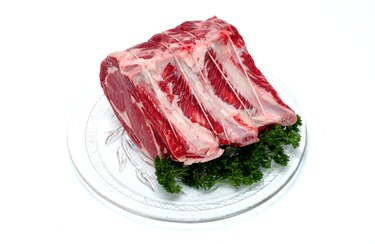Things You'll Need
Prime rib bones, with meaty bits attached, if possible
Onions
Carrots
Celery
Cold water
Spoon
Aromatics such as parsley, peppercorns and thyme
Bowl
Ice
Food-storage containers
Sieve
Cheesecloth

You would think slow cookers were designed solely for cooking beef stock with prime-rib bones. Slow cookers insulate and retain heat better than stock pots, they hold a few pounds of bones without overcrowding and maintain the precise temperature range needed to render connective tissue -- 180 to 205 degrees Fahrenheit. Prime-rib bones are chock-full of the components needed to make velvety, rich, gelatinous stock: collagen, marrow, elastin and a host of proteins. You can make a dark, roasted beef stock if you use bones from a roasted prime rib, and a clear, crisp stock if you use bones from an uncooked prime rib.
Step 1
Rinse the prime rib bones in cool running water to remove any impurities that can cloud the stock. Set the bones aside.
Video of the Day
Step 2
Add mirepoix, or two parts roughly diced onions to one part each roughly diced carrots and celery, to the slow cooker in an even layer. Mirepoix adds a subtle undercurrent of flavor to stocks, broths and soups. There are a few regional variations of mirepoix you can use instead, such as the holy trinity -- two parts diced white onions to one part each diced celery and green peppers -- and sofrito, or one part minced garlic to three parts each diced onions, peppers and tomatoes. The tomatoes, however, will cloud the stock.
Step 3
Lay the prime rib bones on their sides on top of the mirepoix and cover them with cold water. Place the lid on the slow cooker.
Step 4
Set the slow cooker to low. Don't remove the lid during the first two hours; it takes a slow cooker about two hours for it to reach about 180 to 205 degrees Fahrenheit.
Step 5
Remove the lid after two hours and skim the surface of the stock with a spoon to remove the froth.
Step 6
Add aromatic herbs and spices to the slow cooker after you skim the surface. Aromatic herbs, also referred to as "aromatics," such as parsley stems, bay leaves, thyme sprigs and black peppercorns, are classic ingredients used to add aromatic body to stocks, broths, soups and sauces, and are the herbal counterpart of mirepoix. Avoid pungent aromatics, such as coriander, because they will overtake the pure flavor of the stock.
Step 7
Replace the lid and cook the bones in the slow cooker for three hours. Skim the surface of the stock about every 45 minutes, and check the level of the water. Add water as needed so the bones stay covered.
Step 8
Turn the slow cooker off after three hours and remove the lid. Remove the bones from the slow cooker and discard them.
Step 9
Fill a large bowl or food-storage container half full of ice and half full of water to make an ice bath. Line a sieve with a layer of cheesecloth.
Step 10
Place the sieve over an empty food-storage container. Pour the stock through the cheesecloth-lined sieve and into the food-storage container.
Step 11
Place the container of hot stock in the ice bath. Don't allow ice water to enter the container of stock.
Step 12
Let the stock reach room temperature in the ice bath and remove it. Seal the food-storage container of stock and place it in the refrigerator. Use the stock within three days.
Tip
Don't skim the fat that rises to the top of the stock when it cools. The fat congeals and forms a natural seal that prevents air exposure. You can spoon off the cold fat when you're ready to use the stock.
Warning
Don't fill the slow cooker more than three-quarters full. The three-hour simmering time starts after the slow cooker reaches temperature after two hours.
Video of the Day